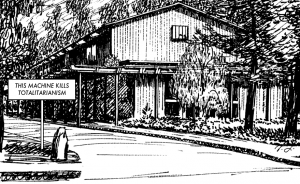I’ve just finished reading Mark Chavez’s book American Religion: Contemporary Trends (Princeton University, 2011), which is well-written and blessedly brief. Chavez’s major conclusion: religious participation in U.S. congregations is either stable or declining (it’s not clear which), but it is definitely not increasing.
Towards the end of the book, Chavez brings up a reason why we should be concerned about declining participation in U.S. religion. Chavez writes:
If half of all the social capital in America — meaning half of all the face-to-face associational activity, personal philanthropy, and volunteering — happens through religious institutions, the vitality of those institutions influences more than American religious life. Weaker religious institutions would mean a different kind of American civic life.
Of course we should not be surprised to learn that in this time of civic disengagement in the U.S., involvement in congregations is at best stable, and at worst in decline — that would fit in with the wider sociological trend. Nevertheless, we should worry that congregational participation is at best stable. James Luther Adams, the great mid-twentieth century Unitarian Universalist theologian, used his experiences in Nazi Germany to demonstrate that weakened voluntary associations led to weakened democracy, allowing totalitarianism to establish a foothold.
If U.S. participation in religious congregations declines, that means half of all participation in voluntary associations declines — which, depending on your political persuasion, might be something to worry about. On the other hand, if you want another reason to justify your participation in a local congregation, you could say that going to Sunday services helps fight totalitarianism. Woody Guthrie’s guitar had a sticker on it that proclaimed “This machine kills fascists” — maybe we should place signs out in front of our congregations that say “This machine kills totalitarianism.”
Proposed sign for the front of the Unitarian Universalist Church of Palo Alto (click for a larger image)


This house destroys totalitarianism
Erp, I’m just being consistent with Woody Guthrie. Calling a guitar a machine is just about as silly as calling a congregation a machine.
I was going to quibble but then I checked the OED definition. Meaning I.1.a gives a whole different feel to the phrase.
Democarcy never had much foothold in Germany to begin with.
Re: ….you could say that going to Sunday services helps fight totalitarianism.
Growing up in the isolationist midwest, I’d say most of the Protestant Mainline at least didn’t see Hitler or Totalitarianism as much of a problem. Read Charles Clayton Morrison for example and you sense a guy far more fearful of the United States than he was of Hitlers Germany.
Read his response to Horror Stories Coming out of Poland, Christian Century, Dec 9, 1942, and you see a fellow intent on debunking the threat of totalitarianism. Better to have stayed away from Church listening to preachers of his sort I’d think.
Germany to this day filled with “Vereins” of one sort of the other since unification in 1871. Elgin and Aurora Illinois both homes to still thriving Turnvereins. It’s a cultural thing but they didn’t help much drive off hitler. If anything, Hitler just gave greater venues to these clubs under state sponsership… sing, wear uniforms, carry torches.
Erp — And one of the examples given in the OED specifically refers to a pulpit as a “machine.” Interesting.
Bill — Adams’ point was sociological, and based on observation: one of the first things totalitarians do is they shut down the voluntary associations, or co-opt them to the purposes of the regime; which is what Hitler did. It’s really worth reading some of his essays on this topic.